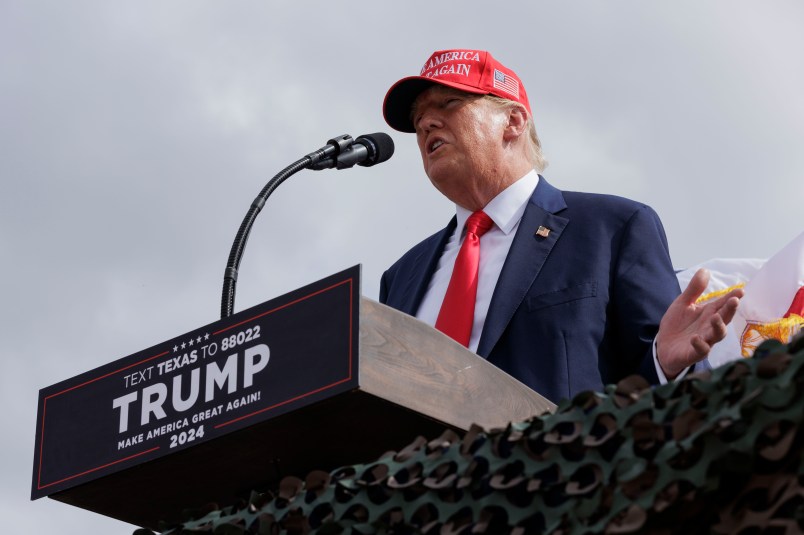A federal appeals court Monday struggled with whether and how to lawfully restrict criminal defendant Donald Trump’s pre-trial speech given his history of targeting court personnel and witnesses with vitriol that prompts his followers to threaten and harass those he names.
U.S. District Judge Tanya Chutkan had already handed down a gag order last month in the Jan. 6 case against Trump to keep him from ginning up his followers to go after individuals involved in his trial, but still allow him to hold forth on the supposed unfairness and political motivation underlying the case.
The D.C. Circuit panel — featuring two judges appointed by Barack Obama and one by Joe Biden — seemed torn, bombarding both sides with hypotheticals and granular questions.
During the first half of the arguments — which stretched more than an hour beyond the allotted time — the judges expressed skepticism about the near-limitless speech Trump lawyer John Sauer argued that the former president is entitled to, given that he’s currently a political candidate.
Judge Cornelia Pillard pressed on a point she said she found “really elusive” throughout Sauer’s presentation.
“I don’t hear you giving any weight at all to the interest in a fair trial,” she said. “Am I right that you don’t? That simply because the defendant is a presidential candidate and he wants to speak on anything he wants to speak, and he basically indiscriminately wants to post on social media, that there can be no restraint of his speech — because any restraint, no matter how tight a nexus to protect a fair trial, is overcome by his campaign interests?”
She added minutes later that Sauer’s answers were “revealing of the fortitude that you accord to the First Amendment and the lack of any role for orders protecting the judicial process.”
Judge Patricia Millet too sounded incredulous at times, particularly when she served up a series of hypotheticals to Sauer, trying to identify examples of Trump speech that he conceded would endanger the fairness of the trial.
She spun one up that involved Trump posting the day before Mike Pence was scheduled to testify that Pence could still redeem himself if he said the right thing at trial.
“Your test doesn’t even allow for that,” she marveled to Sauer.
The judges, though, didn’t restrict their tough questioning to Trump’s side.
They pressed Cecil VanDevender, assistant special counsel, with a series of hypotheticals picking at the line between which speech would be permissible and which wouldn’t, down to specific insults.
“A balance has to be undertaken here and it’s a very difficult balance in this context,” Millet said. “We certainly want to make sure that the criminal trial process and its integrity and its truthfinding function are protected, but we gotta use a careful scalpel here and not step into really skewing the political arena.”
She presented some hypotheticals from a vantage point sympathetic to Trump, where he’s gagged from responding directly to accusations others make about him.
The case is just one of many Trump is embroiled in where his conduct has raised debate over restricting his speech while a criminal defendant and to what extent, given his predilection for identifying sometimes even low-profile individuals as agitators working against him. One memorable episode from his New York fraud case, where he has already been fined for violating a currently-suspended gag order, involved him falsely accusing the judge’s law clerk of being “Schumer’s girlfriend” — referring to the Senate majority leader — who is “running this case against me.” That order too will be relitigated by an appeals court in the next few weeks.
“The concern is that it seems at times your position would be that the district court’s hands are tied until we actually know there has already been harm to the integrity of the trial, for example that a witness has been intimidated,” Judge Bradley Garcia said to Sauer. “What evidence short of that — you certainly can’t be saying that’s what we need — what evidence short of that would the district court need before it could step in and enter an order like this?”







I see no mention here of how gag orders work for everyone else. Are the gag orders more strict on Trump? What would the sanctions be for another defendant engaging in Trump’s behavior?
It seems that the defense’s argument comes down to “[Former] President Trump is a special, unique-in-all-the-world individual and nothing he does or can do can be considered wrong in any sense of the word. So, just stand back and marvel at his one-of-a-kind wonderfulness.”
Evidence abounds that Trump intimidates people through direct and indirect threats of violence. There’s Romney’s reflections about senators pulling their impeachment punches, there’s Cassidy Hutchinson’s testimony after she dumped her Trumpland lawyer, there’s the death threat against Judge Chutkan, there are the pipe bombs mailed by Cesar Sayoc, there’s Ruby Freeman and Shaye Moss, there are the pedophilia accusations against Rusty Bowers, … the list is quite long.
If the Judges, Clerks of the Court and so on are not running for office then what is the problem with a gag order?
If he wasn’t being treated as a special defendant with more rights than the average person his ass would be in jail. The way courts are treating him shows you that people with money, a media platform and power are treated different than the rest of us.